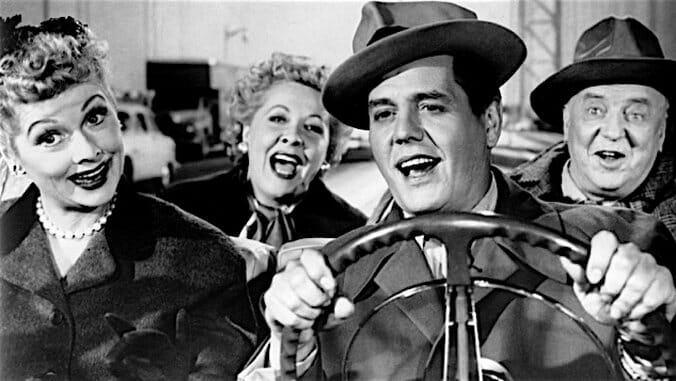How I Love Lucy and Desilu Productions Defined the Modern Sitcom

I Love Lucy is one of the most iconic sitcoms of all time. It’s a show so well-structured, and so beloved, it continues to air in 2016, even though the last new episode premiered in 1957. It was the first show inducted into the Television Hall of Fame, and multiple publications, including TV Guide and TIME, have named it one of the best television shows of all-time. While I Love Lucy wasn’t the first sitcom, it can be argued that it is the series from which the modern concept of the sitcom stems.
This is not just a matter of how it influenced shows that followed it, although many series have clearly been (and still are) influenced by the wacky adventures of Lucy and Ricky Ricardo. And although Lucille Ball’s pregnancy was worked into the show—a huge point of reference when talking about the revolutionary aspects of the show—it’s a minor point in the grand issue of the legacy of the series. Where Ball and her husband Desi Arnaz really made an impact was in the certain innovations they made in the way television shows were filmed and stories were presented.
First off, the fact that Ball and Arnaz got to star in the show was fairly impressive to begin with. Ball had been starring on the radio show My Favorite Husband and CBS wanted to turn that into a TV show with her radio co-star Richard Denning. However, Ball pressed them to let her cast her actual husband Arnaz. Since he was Cuban, this led to some resistance. To their everlasting credit, Ball remained steadfast, and Arnaz was eventually cast on the show.
Together, Ball and Arnaz remained determined to bring their vision to television. While they were cajoled into creating a weekly show instead of a biweekly show, they would not bend in other areas. The show’s sponsor, Phillip Morris, wanted them to film the show in New York, which is where television happened at the time. But Lucy and Desi wanted to film in Los Angeles. This was not ideal, because, back then, television, generally speaking, aired live in the Eastern Time Zone, and then low quality kinescopes of those were taken and shipped out west, where far fewer people lived at the time.
Lucy and Desi didn’t want to just stay in Los Angeles because it was convenient for them (Ball was pregnant with their first child); they wanted to shoot on film so that the quality would be better, and so that both coasts could enjoy high quality picture. In order to make this happen, they took a significant pay cut, and took on the role of producers through their new production company, Desilu.
-

-

-

-

-

-

-

-

-

-

-

-

-

-

-

-

-

-

-

-

-

-

-

-

-

-

-

-

-

-

-

-

-

-

-

-

-

-

-

-









































